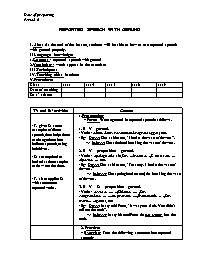Ôn tập môn Tiếng Anh khối 11 - Period 6: Reported speech with gerund

I. Aim: At the end of the lesson, students will be able to how to use reported speech with gerund properly.
II.Language knowledge:
1.Grammar: reported speech with gerund
2.Vocabulary: words appear in the exercises
III.Techniques:
IV.Teaching aids: handouts
V.Procedure:
Bạn đang xem tài liệu "Ôn tập môn Tiếng Anh khối 11 - Period 6: Reported speech with gerund", để tải tài liệu gốc về máy bạn click vào nút DOWNLOAD ở trên
Date of preparing Period: 6 REPORTED SPEECH WITH GERUND I. Aim: At the end of the lesson, students will be able to how to use reported speech with gerund properly. II.Language knowledge: 1.Grammar: reported speech with gerund 2.Vocabulary: words appear in the exercises III.Techniques: IV.Teaching aids: handouts V.Procedure: Class 11a1 11a4 11a5 11a6 11a9 Date of teaching Sts s’ adsent T’s and Ss’ activities Content - T. gives Ss some examples of direct speech, then helps them to change them into indirect speech, using infinitives. - Ss are required to looked at the examples to draw out the form. - T. also supplies Ss with some more reported verbs. 1.Presentation: * Form: We use gerund in reported speech as follows. 1. S + V + gerund. - Verbs: admit, deny, recommend, regret, suggest, ect. - Eg: Direct: She said to me, “I broke the vase of flowers”. --> Indirect: She admitted breaking the vase of flowers. 2. S + V + preposition + gerund. - Verbs: apologize (to sb) for, dream o.f, insist on., object to., ect. - Eg: Direct: She said to me, “I’m sorry. I broke the vase of flowers.” --> Indirect: She apologized (to me) for breaking the vase of flowers. 3. S + V + O + preposition + gerund. - Verbs: accuse..of, blame..for, congratulate...on, prevent....from, thank.for, warn ..against, ect - Eg: Direct: Mary told Peter, “It was your fault. You didn’t tell me the truth”. --> Indirect: Mary blamed Peter for not telling her the truth. - Ss work in pairs to do the exercise. - T. calls on some Ss to read their answers, and makes corrections. 2. Practice: * Exercises: Turn the following sentences into reported speech: 1. “You took the money,” he said. --> (accuse) 2. “I stole his bicycle,” he said to the police. --> (admit) 3. He said to the police, “I didn’t steal the bike”. --> .(deny) 4. He said, “I’m sorry I’m late”. --> (apologize) 5. “I’ll drive you to the airport. I insist,” John said to Linda. --> ..(insist) 6. “I’m happy to hear that you have passed the final exam. Congratulations!,” Jim said to me. --> (congratulate) 7. “It was nice of you to invite me to dinner. Thank you,” Miss White said to George. --> ..(thank) 8. “Don’t play with the matches,” I said to Jack. --> ..(warn against) 9. “I must have made a mistake in the calculations,” said Mr Forest. --> (admit) 10. “I’ll pay for the meal,” Sarah insisted. -->..(insist) 11. Neil told us, “Perhaps we can go to Paris for the weekend.” -->(suggest) 12. “I’m sorry. I couldn’t come to visit you last summer,” Kate said to her parents. --> (apologize) 13. “I hear you won the championship. Congratulations!,” Said Dane. --> ..(congratulate) 14. “We should take the jumper back to the shop,” Jack said to us. --> (recommend + O + to-inf) --> ( recommend + gerund) 15. “It’s not true! I have never been arrested by the police,” Larry said. --> (deny) 16. “I always want to be a rich man,” said David. --> (dream) 17. The manager told the visitors, “Don’t stay at the hotel near the airport.” --> (warnagainst) --> (warn to-inf) 18. “Let’s eat out tonight,” said Tom. --> (suggest) - T. sets homework. - Ss do the task at home. 3. Homework: Revise today’s lesson. Do all the exercises again. Comments:
Tài liệu đính kèm:
 period 6.docx
period 6.docx





